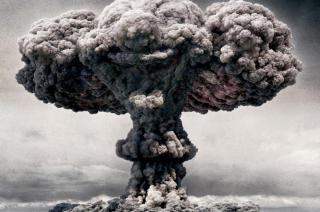
TOWARDS ZERO BRIEFING REPORT NO. 4
Embedding the CTBT in norms, law and practice by Dr Rebecca Johnson
UNA-UK’s fourth Towards Zero briefing report, written by Dr Rebecca Johnson, examines the prospects for the entry into force of the Comprehensive Nuclear-Test-Ban Treaty (CTBT).
Summary of the report
Since opening for signature in 1996, the CTBT has been signed by 183 states and ratified by 189. However, it still has not entered into force. For the Treaty to enter into force it must be ratified by all states with nuclear research capabilities, and eight such states (the United States, China, India, Pakistan, North Korea, Israel, Iran and Egypt) have either failed to ratify or failed to sign. In this report, Dr Johnson assesses the prospects for the Treaty’s full entry into force, as well as looking at back-up strategies and more general ways of reducing the significance of nuclear weapons.
Dr Johnson identifies U.S. ratification as the key barrier to the CTBT’s full entry into force, as movement from the U.S. would likely trigger a domino effect among other states. She argues that the Treaty’s implementation is in U.S. interests, whether it is viewed in terms of national security or from a humanitarian perspective. However, domestic politics in the Senate continue to block the CTBT’s progress. Dr Johnson therefore calls on the Obama administration to deliver on his stated commitment to the CTBT by making a sufficiently forceful case for the Treaty to put pressure on the Senate.
Despite the obstructive behaviour of a number of states, Dr Johnson argues that the CTBT has been a positive force for progress towards nuclear disarmament, and can continue to be so in the future. She contends that the Treaty is already firmly embedded in international law, and that it has contributed significantly to the overall delegitimising of nuclear weapons. Moreover, a fall-back option exists in the form of the provisional application of the CTBT among those states which have already ratified. Dr Johnson concludes by asserting that future progress will depend heavily on leadership and “political courage”.
Dr Johnson is Director of the Acronym Institute for Disarmament Diplomacy, Co-Chair of the International Campaign to Abolish Nuclear Weapons (ICAN), and a member of the International Panel on Fissile Materials.
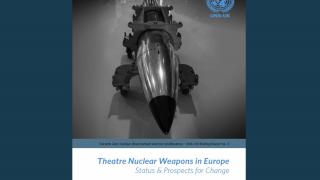
TOWARDS ZERO BRIEFING REPORT NO. 3
Theatre nuclear weapons in Europe: status & prospects for change by Ted Seay
UNA-UK’s third Towards Zero briefing report, written by Ted Seay, examines the future of theatre nuclear weapons in Europe.
Summary of the report
It is a seldom-remarked fact that, 22 years after the end of the Cold War, NATO still deploys scores of nuclear weapons on the territory of five Allied nations in Europe: Belgium, Germany, Italy, the Netherlands, and Turkey. With relatively small-yield warheads and with ranges shorter than both intercontinental-range land-based and submarine-launched weapons, or intermediate-range weapons, these weapons are commonly referred to as tactical or theatre nuclear weapons (TNW). Despite being seen by many as obsolete, TNW remain a central component of NATO’s strategic defence. They also represent a strong point of diplomatic contention between the United States and its NATO allies, and the Russian Federation.
With the weapons themselves and their transport aircraft reaching the end of their deployment lives, Seay seeks to address what the future holds for TNW in Europe and the Alliance that they serve. He outlines the clash between the anti-TNW ideals of states such as Germany and Belgium, and the security concerns of eastern allies such as Turkey and the Baltic states. This discord is exacerbated by France’s emphasis on TNW as a guarantee of sovereignty, and a lack of leadership from the U.S.
Seay goes on to argue that the elimination of TNW from Europe is both desirable and achievable. He identifies the presence of TNW in Europe as a major barrier to cooperation between the U.S. and Russia on reducing their nuclear arsenals. He also deconstructs and refutes the key justifications for NATO TNW (deterrence, assurance and burden-sharing). Seay therefore calls for the Obama administration to assert leadership in persuading its allies of the need to remove TNW, whilst providing assurances that this will in no way diminish NATO security.
Ted Seay is a leading independent arms control and disarmament consultant. He is a policy consultant at the British American Security Information Council (BASIC), and a Senior Associate Fellow at the European Leadership Network. He was previously assigned to the U.S. Mission to NATO as a Political-Military Affairs officer, with responsibility for arms control, disarmament and missile defence.
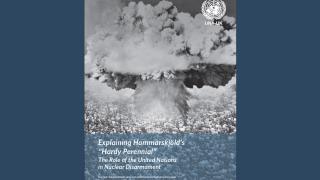
TOWARDS ZERO BACKGROUND REPORT
Explaining Hammarskjöld's "Hardy Perennial" by Dr Randy Rydell
This UNA-UK Towards Zero background paper examines the role of the UN in meeting the challenges of nuclear disarmament, and the prospects for success. It was written by Dr Randy Rydell.
Summary of the report
In 1955, Secretary-General Dag Hammarskjöld referred to nuclear disarmament as a “hardy perennial” of the UN. Fifty-eight years later, efforts at disarmament are still ongoing, and the issue continues to occupy a prominent position on the UN’s agenda. However, the perceived lack of success in achieving disarmament goals has led many to question the UN’s continuing relevance in the pursuit of those goals. Moreover, it has been argued that nuclear disarmament is dependent on the decisions of individual states, thus rendering the UN impotent on the issue. Dr Rydell uses Hammarskjöld’s statements and writings as the basis for his response to such criticisms.
Hammarskjöld believed that nuclear disarmament is dependent on two conditions being met: the development of a shared belief among states in the principle of disarmament, and the shared perception that disarmament is in each state’s national self-interest. If these conditions are not met, there will be insufficient political will to carry out disarmament. This focus on political will leads Dr Rydell to argue that the unsatisfactory outcomes produced by UN mechanisms are the result of the attitudes of states, rather than flaws in the mechanisms themselves. In order to overcome this problem, the UN must take the lead in fostering shared beliefs and appealing to member states’ self-interest.
Dr Rydell then addresses two factors that will shape the UN’s future role in disarmament: democracy and the rule of law. He suggests that democratisation enables greater civil society participation in decision-making, leading to the increase in lobbying required to produce an upsurge in political will for disarmament. With regard to the rule of law, Dr Rydell explores the idea that the process of disarmament will benefit from the increasing trend towards viewing nuclear weapons issues in terms of international humanitarian law.
Finally, Dr Rydell challenges the arguments of those who claim that disarmament is a utopian, unenforceable and dangerous endeavour.
Dr Randy Rydell is Senior Political Affairs Officer in the United Nations Office for Disarmament Affairs.
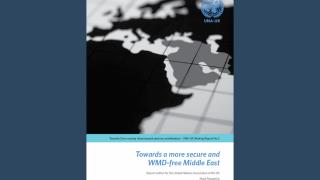
TOWARDS ZERO BRIEFING REPORT NO. 2
Towards a more secure and WMD-free Middle East by Mark Fitzpatrick
UNA-UK's second Towards Zero briefing report, written by Mark Fitzpatrick, examines the prospects for the establishment of a Middle East zone free from weapons of mass destruction.
Summary of the report
Although it is still a distant dream, the rationale for creating a Middle East zone free of nuclear weapons and all other weapons of mass destruction has never been stronger. If established and faithfully implemented – two big 'ifs' indeed – a Zone banning all nuclear, chemical and biological weapons and ballistic missiles would be an answer to the Iranian nuclear crisis; remove the sense of double standards over Israel's nuclear programme; address the threat posed by chemical weapons programmes in Syria and elsewhere; and mitigate one of the dangers associated with introducing nuclear energy in the region. It would also represent the next stage in an expanding network of nuclear-weapon-free zones that now encompasses all land areas in the Southern Hemisphere.
In many ways, however, the goal of abolishing nuclear weapons in the Middle East seems as distant now as it did 35 years ago, when the Zone was first proposed. While every such Zone requires complicated issues to be addressed, three factors multiply the complexity of these challenges in the Middle East: the history of conflict and tension in the region, the asymmetry of nuclear capabilities, and the absence of inclusive regional institutions.
These obstacles notwithstanding, the international community has undertaken a renewed effort to promote the Zone. A key outcome of the 2010 NPT Review Conference was an agreement to hold a conference on this issue in 2012. This report explores how that conference can make progress towards a nuclear-free Middle East.
Mark Fitzpatrick is Director of the Non-Proliferation and Disarmament Programme at the International Institute for Strategic Studies (IISS) in London.
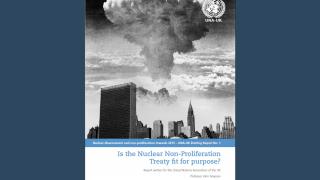
TOWARDS ZERO BRIEFING REPORT NO. 1
Is the Nuclear Non-Proliferation Treaty fit for purpose? by Professor John Simpson
UNA-UK's first Towards Zero briefing paper, written by Professor John Simpson, examines whether the Nuclear Non-Proliferation Treaty (NPT) is fit for purpose.
Summary of the report
Since coming into force in 1970, the NPT has been the cornerstone of the international nuclear non-proliferation regime. It addresses three key issues: nuclear disarmament, nuclear non-proliferation and the promotion of peaceful uses of nuclear energy. However, many have argued that the viability of the NPT is increasingly threatened by a changing international context and a lack of political will to adapt to that change. It has therefore been suggested that the 2010 review was not a success, but rather a postponement of failure. In this report, Professor Simpson assesses the validity of such claims.
The report begins with a brief outline of the NPT’s history, before addressing the issue of political will. Professor Simpson asserts that those states which are party to the NPT have failed to demonstrate real commitment to a robust disarmament and non-proliferation regime. He argues that states have not taken adequate steps to:
- Facilitate disarmament and non-proliferation among the five nuclear-weapon states
- Prevent proliferation among non-signatories
- Ensure that signatories (notably Iran) meet their obligations
The lack of political will is compounded by problems in interpreting and implementing the NPT. Furthermore, Professor Simpson notes that the geopolitical climate has changed significantly since the NPT came into force, leading to claims that its mechanisms are no longer fit for purpose. The end of the Cold War has increased the prevalence of regionalised security challenges, while the shift of economic power out of the Euro-Atlantic area has enabled emerging powers to force different ideas onto the international agenda.
Professor Simpson concludes by identifying a number of key priorities. These include setting clear targets for disarmament and nuclear security, and working towards a nuclear weapon-free zone in the Middle East.
Professor John Simpson was founding Director of the Mountbatten Centre for International Studies at the University of Southampton and Professor of International Relations at that university. He is now one of its Emeritus Professors. In 1999 he was awarded an OBE for "services to nuclear non-proliferation".

